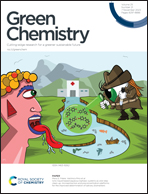Development of high methanol-tolerance Pichia pastoris based on iterative adaptive laboratory evolution†
Abstract
Methanol, as an environmentally friendly renewable energy source, is considered an ideal C1 resource in biomanufacturing. However, due to its cytotoxicity, microorganisms can only grow in low methanol concentrations, resulting in less efficient metabolism and biochemical production from methanol. Therefore, it is essential to develop chassis strains that can be used in high methanol concentrations as the sole source of carbon. In this study, we aimed to industrialize high-methanol tolerant Pichia pastoris (P. pastoris) chassis cells with stable traits using iterative adaptive laboratory evolution (microbial microdroplet culture (MMC) and shake flask culture (SFC)) and clarify the mechanism of tolerance. The results suggested that the evolved strain WS026-4 (MMC-SFC) exhibited the ability to survive in BMMY medium containing 10% methanol as well as BMMY agar medium with a methanol concentration of 13%. WS026-4 (MMC-SFC) exhibited good stress homeostasis at high methanol concentrations, which is largely dependent on regulating membrane lipid metabolism. The analysis of WS026-4 (MMC-SFC) demonstrated alterations in the composition of crucial phospholipids and the expression of associated genes. Notably, a substantial augmentation in the levels of phosphatidylcholine (PC) emerged as a prominent determinant in bolstering the resistance of the strain to methanol. In addition, the strain overexpressing the phosphatidylethanolamine N-methyltransferase 2 (PET2) gene could grow on 8% methanol BMMY agar medium. This finding suggests that PET2 is a crucial target for enhancing methanol tolerance. This study sets the stage for expanding the potential of exploiting P. pastoris as an organic one-carbon platform for the production of biochemicals and biofuel.



 Please wait while we load your content...
Please wait while we load your content...